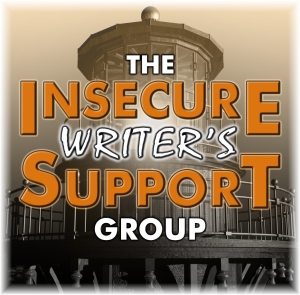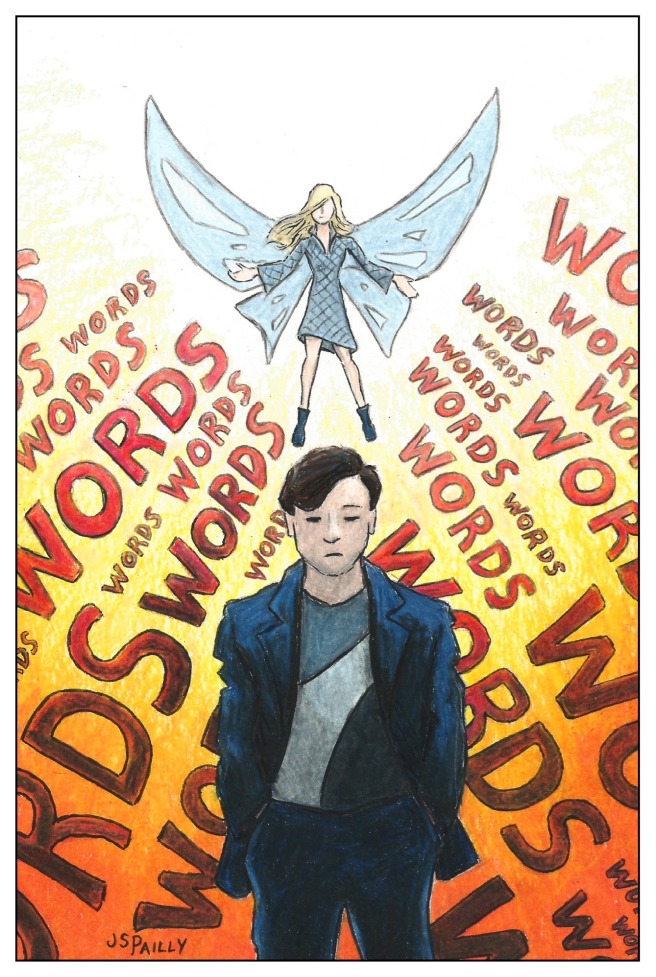Hello, friends! Welcome to this month’s meeting of the Insecure Writer’s Support Group, a monthly blog hop created by Alex J. Cavanaugh and co-hosted this month by Diedre Knight, Tonya Drecker, Bish Denham, Olga Godim, and JQ Rose. If you’re a writer and if you feel insecure about your writing life, click here to learn more about this awesomely supportive group!
A family emergency happened last week, and I’m still a little bent out of shape because of that. Getting back into writing after dealing with all that stress has been a struggle, so today I’m going to turn the floor over to my muse. She has something she wants to say, and maybe it’s something your muse would like to hear.
* * *
Greetings to all my fellow muses, inner critics, and motivational demons. I am James Pailly’s muse. It’s my job to give James guidance and inspiration in his writing life, but I am not the only source of guidance and inspiration he turns to (nor should I be). He reads and does research. He talks to people. He talks to other writers. Sometimes he finds good, sensible advice in this way; other times, the advice he gets is not so sensible.
What works for one writer will not necessarily work for others. Each writer is unique. Each writer is special. They have their own strengths and their own struggles. But writers are human, and humans can be tempted by broad generalizations and oversimplified explanations—especially when their own unique struggles start to feel overwhelming.
My writer is often told that he should not edit while he writes, as if editing and writing are two separate and distinct activities. First there’s a writing phase, then there’s an editing phase, and there’s supposed to be a hard line between the two. Perhaps some writers really do work this way. Perhaps a majority of them are able to operate this way. But that is not the way my writer works, and it never will be.
My writer will write a sentence or two—a paragraph—an exchange of dialogue—then he’ll go back and rewrite it all before moving on to the next part. He’ll finish a page, then go back and fix the page that came before it. He’ll finish a chapter, then tweak an earlier scene. Every word my writer writes is subject to change, at any time, for any reason, until the story is finished. If that means we have to go back and rewrite half of the whole book, that’s fine. The sooner we get started on those rewrites, the better. And every time some writing guru tells my writer he’s doing it wrong, I am there to remind my writer what he should already know about himself.
For my writer, writing and editing are thoroughly intermingled activities. It’s a messy process. It’s a labor-intensive process. My writer does get frustrated, sometimes, and wish there were an easier way. But this is what’s best for him, and deep down he knows it.
Should your writer write (and edit) the way mine does? I can’t tell you that. Ultimately, you will have to determine what is right and what is wrong for your own writer.


James! I hope your emergency stays solved. As for writing and editing… for a long time I followed the advice to keep those functions separate. Just vomit the first draft out (figuratively – as poor as my typing skills are, the keyboard doesn’t need more problems.)
I have always backed up to read through (and edit) what I wrote over the past day or two or three. But… but… when I know a word I wrote is off-target or simply dull, it nibbles at the back of my mind. Now I keep a thesaurus open in another window as I write and consult it from time to time. It’s fast, and my brain feels happier.
LikeLiked by 2 people
I write by hand, so I keep a physical thesaurus in my writing space. Actually, I have two, because if one thesaurus doesn’t have the word I want, there’s still a chance the other one will. I don’t seem to use them as much as I used to, but it’s still reassuring knowing they’re there if I need them.
LikeLike
Hi. I hope things are sorted for you now. I write in one go and edit after a while. That’s my way but as you said, different things work for different writers.
LikeLiked by 1 person
And if that works for you, great! Don’t let anyone tell you to change your process.
LikeLiked by 1 person
Write the way that works for you. I might write a sentence and then go back and edit it, but I usually keep moving forward until the end. Unless there is a long pause then I have to go back and refresh my memory. And maybe edit a bit…
LikeLiked by 1 person
Yeah, a long pause is a big problem. Under normal circumstances, I may not always make forward progress with a story, but I’m still making progress of some kind. But if I have to stop writing entirely, it takes a lot of effort to get my mind back into the story world.
LikeLike
You can’t catch a break with these family emergencies. Hope it gets better.
I generally write the same way. I did use the write-only approach years ago on a NanoWrimo novel, where you have to write a 50,000 word story in one month. It helped in forcing out the minimum word count every day, but I found it stressful. I’m much more comfortable editing as I go.
In the end, it’s whatever gets the words out. That’s different for every writer. Reportedly it’s even different for the same writer at different stages of their life.
LikeLiked by 2 people
I never thought about that, but that makes sense. My writing process has changed over the years, along with everything else about me. I guess my process could change again in the future.
LikeLiked by 1 person
It took me a while to learn that what works for one writer will often be terrible advice for another writer. People who dispense prescriptive advice on how to write need to know that we are all different! I’m actually the same as you in this regards, James. I edit as I go and turn out prose that is 99% finished. Yay us!
LikeLiked by 2 people
That is one thing I really like about editing as I go: when it’s done, it really is done. Aside from mostly minor proofreading stuff.
LikeLike
I hope all smooths out! Writing is such an individual thing, both for writers and readers. To change that would be a catastrophe.
LikeLiked by 1 person
A catastrophe indeed! For people who are new to writing, I think it makes sense to experiment. But once you find something that works, stick to it, and don’t worry if anyone says you’re doing it wrong.
LikeLike
I think my muse, Monica Muse, told me a long time ago that I have to write Draft all the way through before editing or I’d not only lose sight of the idea but also get bored with the whole process. However, I can imagine that your muse’s method would work better for me if I wrote novels or novellas, but I mostly write short stories. We each have to use the method that works best for us, kind of as your muse indicates.
LikeLiked by 1 person
Yeah, I could see one method working for shorter stories and a different method working for longer formats. That makes sense to me. Though in my case, I take the same approach to everything I write. Even blog posts.
P.S. My muse waves hello to yours.
LikeLike
I started a writing group last year. We were just saying at one of our meetings about how much are styles vary. One writes exactly the same way you do, James, so don’t worry, you’re not alone.
LikeLiked by 1 person
Sounds like a good writing group. It’s nice when writing groups accept those differences in method and style. That’s not always the case.
LikeLike